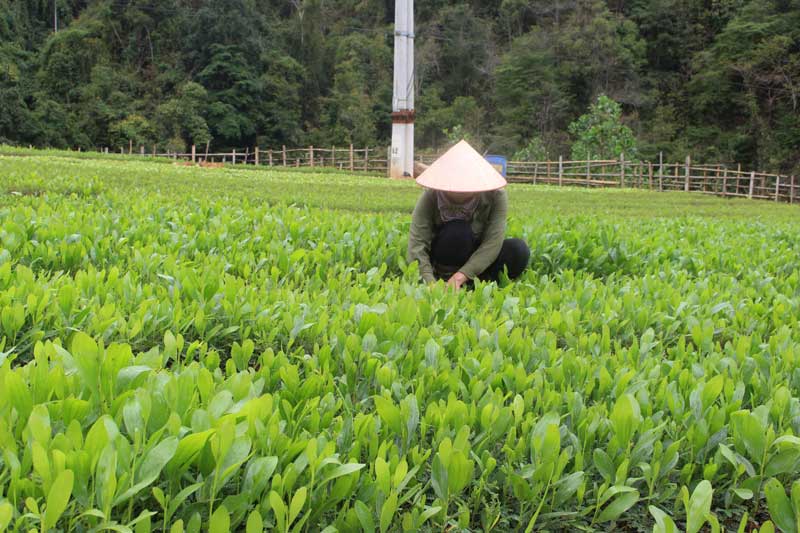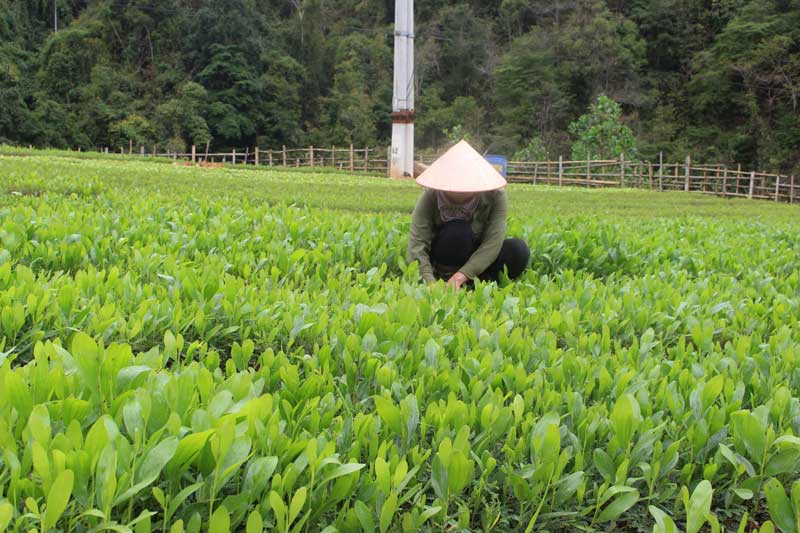
(HBO) - Da Bac district has a total forest area of 47,143.24 ha, including 31,458.04 ha of natural forest and 15,685.20 ha of planted areas. In recent years, afforestation has helped generate jobs and bring high incomes for local people.
 Plant
nurseries in Da Bac district ensure sufficient supply of saplings for
afforestation in 2020.
Plant
nurseries in Da Bac district ensure sufficient supply of saplings for
afforestation in 2020.
Afforestation is carried out in all
communes and towns in the district, mainly in Tu Ly and Toan Son communes and
Da Bac town. The district has planned to plant trees on 800 hectares of forest
land this year. Some kinds of trees are selected for afforestation through
research on soil and climate, such as acacia, doi, mo and mock Bodhi trees.
To prepare for the implementation of the 2020 afforestation plan, the district
has strengthened communications work to provide locals with information on the
role, effect, meaning and economic efficiency of afforestation for the
environment and life.
Shortly after the completion of forest exploitation in 2019, forest rangers
guided people to clear vegetation. The district’s Division of Agriculture and
Rural Development also guided communes and towns to register afforestation area
so that the district mapped out a plan on saplings to serve the work when conditions
are favourable.
Besides, the district has provided training on planting techniques with the
application of science and technology for farmers.
After the Lunar New Year, afforestation took place throughout the district with
the launch of tree-planting festival. The movement received warm response from
officials, staff and locals in the locality. On the occasion, the district
planted 51,150 perennial trees of all kinds. The whole district has to date planted
100 ha of forest. The district targets to complete the 2020 forestation plan by
the end of September./.
According to data from the Hoa Binh Provincial Party Committee, the industrial production index for the first six months of 2025 is estimated to have increased by 20% compared to the same period last year. This marks the highest year-on-year growth rate for this period since 2020.
In the first six months of 2025, Hoa Binh province’s export turnover was estimated at 1.145 billion USD, marking an 18.11% increase compared to the same period in 2024. Import turnover was estimated at $ 804 million, a 17.15% increase, which helped the province maintain a positive trade balance.
The lives of the ethnic minority farmers in Tan Lac district have gradually improved thanks to the new directions in agricultural production. This is a testament to the collective strength fostered through the professional associations and groups implemented by various levels of the district’s Farmers’ Union.
With the motto the "product quality comes first,” after nearly one year of establishment and operation, Muong village’s Clean Food Agricultural and Commercial Cooperative, located in Cau Hamlet, Hung Son Commune (Kim Boi district), has launched reputable, high-quality agricultural products to the market that are well-received by consumers. The products such as Muong village’s pork sausage, salt-cured chicken, and salt-cured pork hocks have gradually carved out a place in the market and they are on the path to obtaining the OCOP certification.
In the past, the phrase "bumper harvest, rock-bottom prices" was a familiar refrain for Vietnamese farmers engaged in fragmented, small-scale agriculture. But today, a new spirit is emerging across rural areas of Hoa Binh province - one of collaboration, organisation, and collective economic models that provide a stable foundation for production.
Maintaining growing area codes and packing facility codes in accordance with regulations is a mandatory requirement for agricultural products to be eligible for export. Recently, the Department of Agriculture and Environment of Hoa Binh province has intensified technical supervision of designated farming areas and packing facilities to safeguard the "green passport" that enables its products to access international markets.



 Plant
nurseries in Da Bac district ensure sufficient supply of saplings for
afforestation in 2020.
Plant
nurseries in Da Bac district ensure sufficient supply of saplings for
afforestation in 2020.